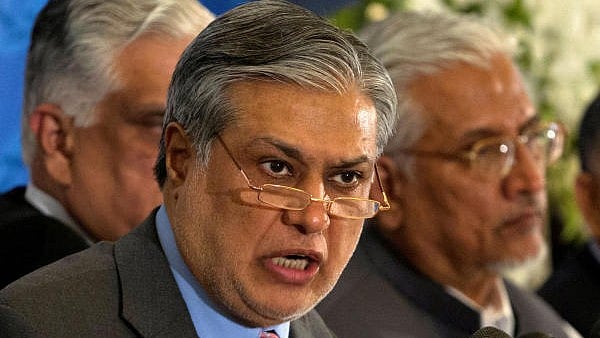
Muhammad Ishaq Dar, Pakistan's Foreign minister
Credit: Reuters File Photo
New Delhi: The move by Muhammad Yunus’ interim government in Dhaka to mend ties with Islamabad suffered a setback on Sunday as Pakistani Foreign Minister Ishaq Dar refused to apologise for the genocide the soldiers of his country’s armed forces carried out in Bangladesh (then East Pakistan) in 1971.
Dar, who flew from Islamabad to Dhaka on Saturday, stated on Sunday that the outstanding issues between Pakistan and Bangladesh arising from the 1971 Liberation War had been resolved twice – first in 1974 and then again in July 2002. His comment came even as Dhaka, despite its newfound keenness in mending bilateral relations, has been pressing Islamabad to apologise for the atrocities that the Pakistan Army unleashed on the people of East Pakistan during the 1971 Liberation War, which gave birth to Bangladesh.
The comment by Pakistan’s foreign minister was rejected by his counterpart in the interim government in Bangladesh, Touhid Hossain, who told journalists that he had not agreed with the statement by his guest.
New Delhi’s relations with Dhaka came under stress after the Awami League’s regime in Bangladesh collapsed, and Sheikh Hasina, the prime minister of the country since 2009, had to take refuge in India in August 2024 in the wake of a mass protest against the brutal crackdown on students and youths who had been demanding an end of reservation in government recruitment.
Apart from the anti-India campaign and the series of atrocities on the minority community in Bangladesh, New Delhi has also been riled by attempts made by Yunus’ interim government in Dhaka to mend ties with Islamabad, apparently prodded by China, which has been keen to expand its geopolitical influence in the neighbourhood of India, especially in South Asia.
Yunus, himself, met Pakistan Prime Minister Shehbaz Sharif twice last year – first on the sidelines of the United Nations General Assembly in New York and then again on the margins of the D-8 summit in Cairo.
Lieutenant General S M Kamrul Hasan, Principal Staff Officer of Bangladesh Armed Forces, met Pakistan’s defence secretary Muhammad Ali in Islamabad early this year. He also had a meeting with Pakistan Army chief, Gen Asim Munir, in Rawalpindi. It was a rare visit by a senior Bangladesh Army officer to Pakistan. This was followed up by the visit of Pakistani military intelligence officers to Bangladesh.
Dhaka asked Islamabad to apologise for the killing of hundreds of thousands of Bengali-speaking people and raping of countless women of East Pakistan (now Bangladesh) by the Pakistan Army and militias affiliated to it in 1971. Yunus’ interim government in Dhaka also asked Islamabad to pay a reparation of $4.52 billion, covering Bangladesh’s share of undivided Pakistan’s pre-1971 assets. Besides, Islamabad was asked to take back the Pakistanis stranded in Bangladesh for over five decades since 1971.
The issue (of 1971) was settled for the first time in 1974, and again when General Pervez Musharraf visited Bangladesh in the early 2000s, Dar told journalists in Dhaka, adding that the documents agreed on and gestures made in the past were historic in nature for both countries. Hossain later said that he had not agreed with the foreign minister of Pakistan. He also added that Dhaka and Islamabad would continue discussing the issues arising out of the 1971 Liberation War, as it would take some time to resolve the issues lingering
Dar and Hossain, however, witnessed the signing of an agreement to exempt visa requirements for holders of official and diplomatic passports. Besides, the two sides signed Memorandums of Understanding on forming a joint working group on trade, cooperation between the two foreign service academies, collaboration between the national news agencies, and an institutional partnership between the think-tanks of the two countries. A cultural exchange programme was also signed to promote people-to-people ties.
Dar’s was the first visit by a foreign minister of Pakistan to Bangladesh since Hina Rabbani Khar’s in 2012. He called on Yunus, the head of the interim government of Bangladesh, on Sunday, in addition to meeting Bangladesh National Party leader Khaleda Zia and Bangladesh Jamaat-e-Islami chief Shafiqur Rahman.
Pakistan’s commerce minister, Jam Kamal Khan, is also on a visit to Bangladesh.
